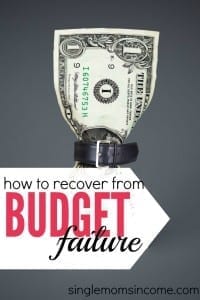 Budgeting failure is something we all experience from time to time. Whether you’re a spreadsheet guru or completely new to budgeting, there’s just so much that can go wrong in a given month. For starters, you can easily underestimate your expenses or overestimate your expenses and wind up wasting the extra money instead of saving it.
Budgeting failure is something we all experience from time to time. Whether you’re a spreadsheet guru or completely new to budgeting, there’s just so much that can go wrong in a given month. For starters, you can easily underestimate your expenses or overestimate your expenses and wind up wasting the extra money instead of saving it.
An unexpected illness can throw you off course or cause you to retreat to your emergency fund for relief. Budgeting failure can often result in debt, embarrassment, and irrational spending.
The good news is that it’s very common to miscalculate your budget and it’s quite easy to bounce back. Failure is a natural part of life that allows us to realize and learn from our mistakes.
My budget has failed plenty of times when I had to put off planned routine maintenance for my car because the money somehow disappeared, reach into my wallet and take out my credit card to cover a purchase, or take out an extra loan just to get through a semester in college.
If your budgeting habits are failing you, here are 5 active ways to bounce back from budget failure.
Scratch Everything and Start Over
When nothing seems to be going right and your budget has clearly fallen apart, you always have the option of starting over. Circumstances change and so should your budget periodically. If you’re cutting your entertainment spending in the winter and increasing your electric or heating bill, your budget should reflect that.
Remove your old budget from your computer or planner and start from scratch to create a new one. Take a few minutes to include all your spending categories and reassess your quarterly and annual goals. Being realistic with yourself and the goals you set will allow you to be able to stick to your budget more successfully.
Don’t Make Failure a Habit
If you notice that things are just not working out, take that as a sign that it’s time to change the way you budget. The worst thing you can do is remain stuck in your ways or try to copy the way someone else constructs their budget each month. What works for one person doesn’t always work for another and in order to stop failing and start succeeding, you’ll need to take a different approach to see what works for your situation.
If you are failing to keep tabs of everything with your written budget, try a digital approach by using a spreadsheet or a budgeting app like YNAB (You Need A Budget). Become accountable to a friend or family member each month to help make sure you stay on track.
Create a Cash Buffer
The main cause of a budget failure is overspending on a planned or unplanned expense which ultimately leads to an unexpected shortage of money. You can cover your bases and prevent this from happening by creating a cash buffer. A cash buffer is similar to an emergency fund, but it’s intended to cover annual and small unplanned expenses that don’t typically fall into the category of an emergency expense.
For example, if your utility bill is $45 more than you budgeted for, you can use the funds from your cash buffer to pay that extra cost. A cash buffer can come in handy when it’s time to pay annual expenses that you don’t budget for on a monthly basis. I like to maintain a cash buffer of around $500 along with the equivalent of at least 1 day’s pay at my day job in case I have to take an emergency day off and don’t have sick hours to cover it.
 Reassess What Failure and Success Means to You
Reassess What Failure and Success Means to You
I’ve been guilty of not budgeting down to zero. That means, I usually don’t assign every penny I earn to a specific spending category in the hopes of having ‘extra’ money left over outside of my regular budget to use as a cash buffer if I need it. I actually shouldn’t use the word ‘guilty’ because I still budget and it’s not wrong to budget this way.
I agree, the most effective way to budget would be to allocate every dollar to a spending or saving category to optimize your financial goals, but this doesn’t always work for everyone especially people who have an irregular income.
So since I don’t budget down to zero every month this can be seen as a budget failure but I see it as a success because I’m still sticking to the limitations of my budget and I’m not over drafting every month.
By understanding that budgeting isn’t always so black or white, you can start to reassess what budgeting success and failure mean to you. Set expectations for yourself and what makes your budget succeed and what makes it fail.
Say ‘No’ To Yourself, Reduce Your Expenses
One of the best ways to get your budget back on track is to reduce your expenses in the easier, more flexible categories like shopping, dining out, and paying for entertainment. Say ‘no’ to yourself more often at the store and take at least 24-hours to contemplate leisure purchases that could possibly throw your budget off course.
Saying ‘no’ to yourself occasionally will force you to prioritize what you really need and want in order to avoid common impulse purchases that you may regret later.
How do you bounce back from a budget failure? Which method from above is the most helpful to you?




Some great approaches to overcoming budgeting failures. One thing I have done recently is replaced ‘budget’ with ‘spending plan’ in my personal finance lexicon. My experience has been that ‘budget’ has many negative connotations, representing constraints and speaks to what you will not, or cannot, do. Conversely, a spending plan is a more positive way to look at the same idea. It speaks to what your values and goals are; and how money should flow in and out of the home. Keep up the good work.
That’s a creative way to put it. Thanks for the comment!
It’s a ” Get Rich Plan” or ” Create Security Plan” Or ” Wealth Building Plan ” …….
It’s all about the cash buffer.
The most important factor behind a budget failure is having an unrealistic approach regarding your earning and expenses. So it is important to have a clear picture of your possible earning amount and indispensable expenses while making a budget. http://blog.cashinasnap.com/9-money-saving-tips-on-a-tight-budget/